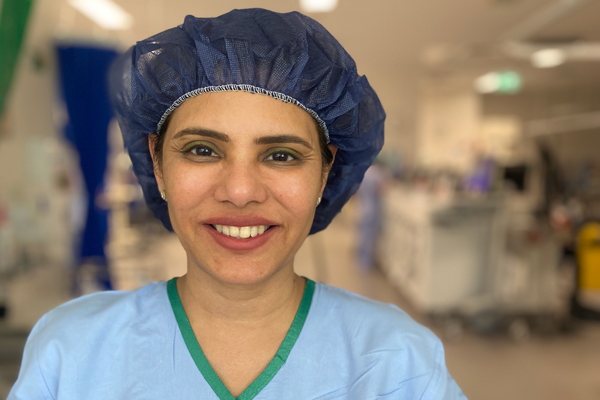- Foreword
- Message from Board Chair & Chief Executive
- 2023 Clinical Research Fellowships
- A message from the RBWH Foundation
- A message from The Common Good
- Metro North Research Excellence Awards
- Research stories
- ICU of the Future
- New approach ruling out pulmonary embolism
- Improving access to healthcare in the prison environment
- Safety and efficacy of peripheral versus centrally administered vasopressor infusion
- COVID-19 learnings set to inform future policy
- Telomere study could provide key to treating debilitating lung disease
- Productive Ward – Releasing time to care
- Brain organoids to revolutionise epilepsy treatment
- Reducing weight stigma in maternity care
- Parkinson’s Disease Check-In program giving people a voice
- Trial brings new treatment for common heart condition
- Teledentistry study shows promise in residential aged care
- Research fellow to boost Oral Health evidence-based care
- Study explores best approach to surgery for painful shoulder osteoarthritis
- The development and pilot testing of a stroke telerehabilitation decision toolkit
- Metro North Health delivers world-first breast scaffold surgery
- Regenerative jawbone hard at work care of collaborative Metro North Health approach
- Jamieson Trauma Institute leads e-scooter and e-bike injury research to drive community safety
- Forgotten fathers in pregnancy and obstetrics
- Putting the Spotlight on nursing and midwifery research
- Improving the health self-efficacy of stroke survivors
Forgotten fathers in pregnancy and obstetrics

Dr Alka Kothari is researching the role of fathers in maternity care
Associate Professor Alka Kothari has been researching the role of fathers in obstetrics for nearly ten years. An obstetrician at Redcliffe Hospital, Dr Kothari is now concluding her PhD research on the role of fathers as consumers of obstetric and midwifery services.
Dr Kothari says that while fathers are essential stakeholders in obstetric healthcare, there is limited information on their health role in preconception, pregnancy and postpartum periods.
“A father’s pregnancy experience significantly impacts their mental health and has implications for the health of the family unit as a whole,” Dr Kothari said.
Dr Kothari says her research has brought together the available evidence base, identified gaps in the literature, created new knowledge and proposed areas for future research.
“Overall, the available research recommends a stronger emphasis on preconception care of fathers, including mental health screening,” she said.
“Traumatic events, such as life-threatening maternal complications, foetal death or stillbirth, have substantial psychological and physical impacts on fathers.”
Dr Kothari said the research is compelling for providing compassionate care to fathers during pregnancy, especially after extenuating events.
“This approach may assist in preventing long-term consequences on fathers, partners, and their children.”
